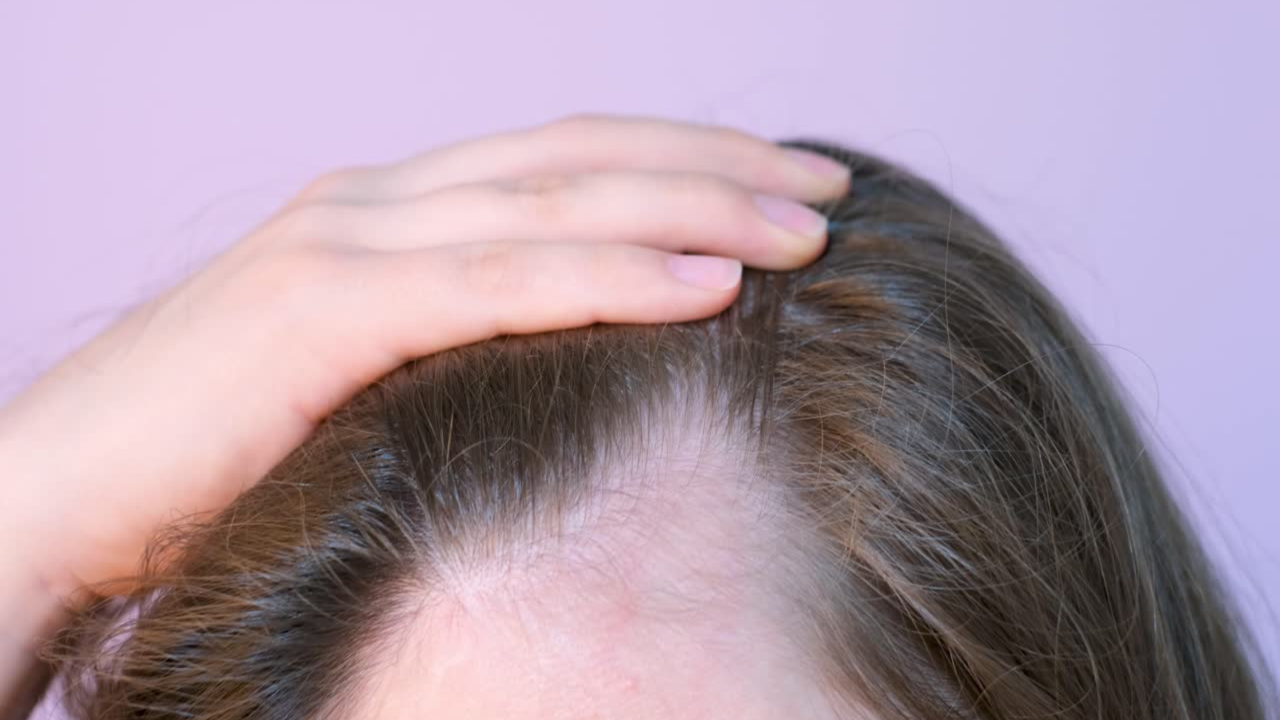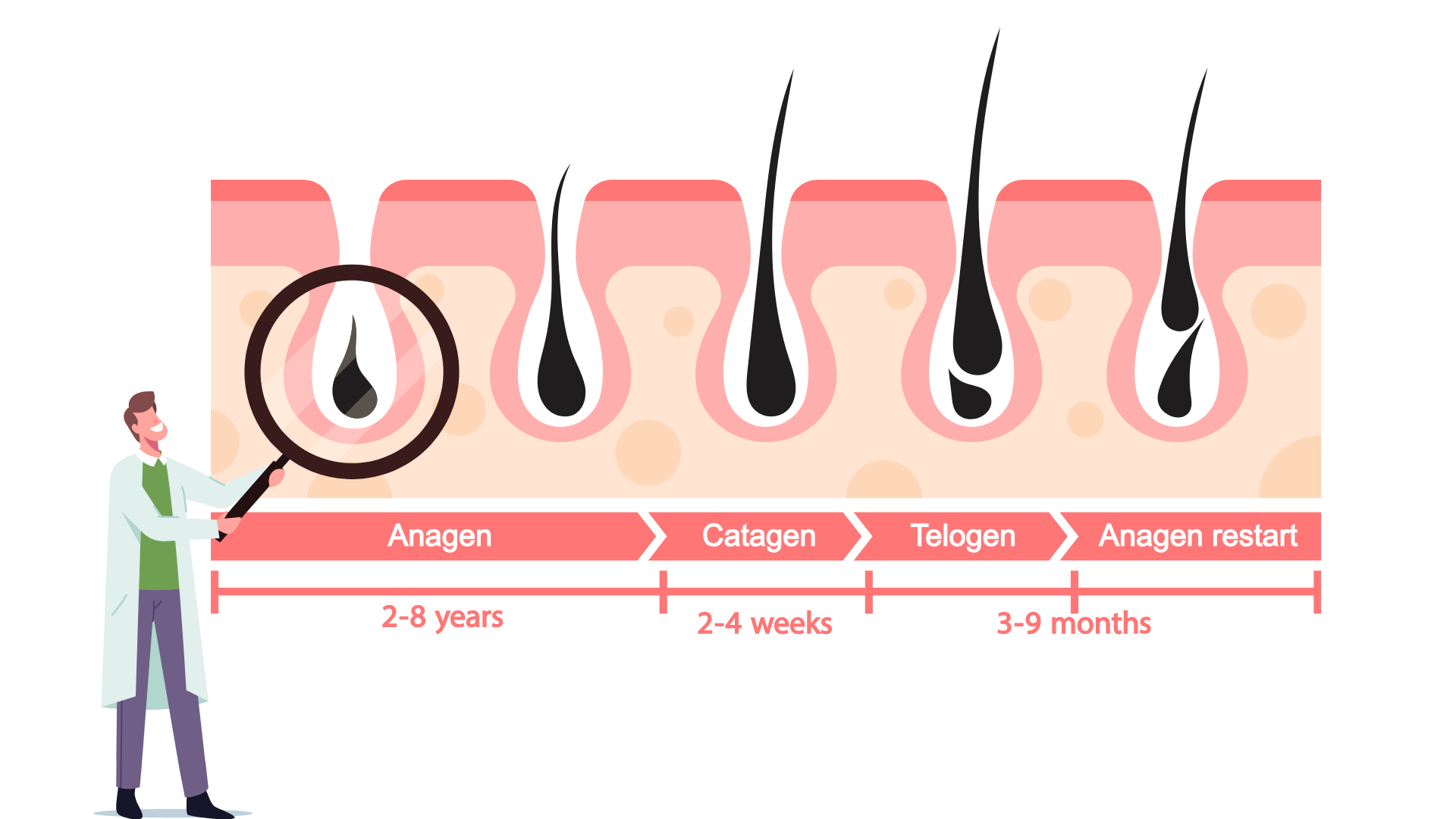Women’s Hair Loss and Autoimmune Problems

Have you been experiencing hair loss or thinning for no apparent reason?
Is it patchy, uneven, or diffuse? Does it move around to different areas? Is it happening in more than one area at a time?
If this sounds familiar, or if you’ve been told you have alopecia areata by a healthcare professional, your body may be attacking your own hair follicles.
You may have also been told that there’s not much you can do about it.
- Maybe they said it’s genetic and you just have to live with it.
- Or maybe you were given a medication like minoxidil to see if it will help.
- Or maybe you’ve been trying fancy shampoos, taking generalized hair-growth supplements, or scouring the internet for anything you can find to save your hair.
If you’re feeling frustrated, you’re not alone - hair loss is complicated and tough to treat. But don’t give up yet! Functional Medicine strategies are fantastic for treating autoimmunity - in fact, sometimes they’re the only strategies that work!
In this article, we’re going to focus on solutions for autoimmune hair loss, but there are many other underlying triggers of hair loss that can be fixed with Functional Medicine strategies.
I cover the top 6 root causes of hair loss and thinning in my Hair Loss Deep Dive Tutorial, which you’ll find in my YouTube membership. Simply click here to sign up and get access to my entire library of members-only content.
Alright, before we get to my best evidence-based solutions for autoimmune hair loss, you need to understand how autoimmunity impacts your hair, including the underlying physiology of autoimmunity itself.
Autoimmune hair loss is often called alopecia areata, but some people with autoimmune-based hair loss are also diagnosed with telogen effluvium, and depending on the pattern of hair loss, whether it’s diffuse or patchy or on the scalp or involving other hair-covered areas of the body, it can have different sub-type names.
Even if you don’t have an official diagnosis for your hair loss, autoimmunity could be a root cause.
Autoimmunity happens when your body has trouble distinguishing your own cells from foreign invaders.
Your immune system gets confused, and starts attacking certain tissues - in this instance, the root of your hair.
This results in inflammatory immune cells becoming concentrated in and around the hair follicles, which causes degeneration and makes the hair more fragile.
The normal cycle of hair growth also seems to be disrupted in folks with autoimmune hair loss, so that hair follicles rapidly progress from the anagen phase, when a hair follicle is normally actively growing, to the catagen and telogen phases, in which hair is dormant.

This causes the hair shafts to become more brittle and fragile, which means they fall out more easily. Folks with autoimmune hair loss will often have lots of re-growth or baby hairs, but they break off before they can grow all the way out.
If you have other autoimmune problems like inflammatory bowel disease, Hashimoto’s, celiac disease, rheumatoid arthritis, or type 1 diabetes, you are at a greater risk of experiencing autoimmune hair loss because your immune system is already having a hard time recognizing your own cells as “self” instead of “the enemy”.
People with one autoimmune condition tend to develop others unless they get it under control.
The good news is that a Functional Medicine approach to assessing and addressing autoimmune hair loss focuses on stopping autoimmunity itself at the root case, which most often begins in the gut or digestive tract.
The health of your skin, including hair follicles, is particularly closely linked to the health of your gut via what’s known as the gut-skin axis.
And when the barrier of your gut wall becomes dysfunctional, it can trigger autoimmunity.
Sometimes this gut barrier dysfunction is referred to as gut hyperpermeability or leaky gut - and it’s been linked in medical research to everything from multiple sclerosis to lupus to autoimmune thyroiditis - and of course, alopecia.

But to understand this key connection, we need to understand what leaky gut is, exactly.
The cells that form the inside of your intestinal wall are all lined up, side-to-side, creating a barrier between the “outside world” of your digestive tract, and the inside of your body - your bloodstream, in this case.
This gut barrier is super important for keeping the right things out and letting the right things in. But, more often than we’d like, the connection between the cells is disrupted or broken, creating what you might think of as little leaks in that barrier, where stuff can get into the bloodstream that doesn’t belong there.
And guess what happens to stuff that doesn’t belong in our bloodstream? That’s right - the body sends the immune system over to take care of it. And that immune response often results in histamine release, along with other immune compounds called immunoglobulins, which then enter the bloodstream and start a search and destroy mission against whatever molecule managed to sneak through that wall.

But the thing with leaky gut is that your immune system is confused - there typically isn’t some big infection to fight or invader trying to harm you.
Sometimes the particle that sneaks through a leaky gut is as innocuous as a bit of carrot, or a friendly bacteria that just ends up in the wrong place at the wrong time.
This can result in a generally over-active immune system or autoimmunity, which then attacks any number of organs and tissues in the body, including the hair follicle.
The resulting inflammation, triggered by your confused immune system, can result in symptoms like joint pain and degeneration, skin rashes, allergies and sensitivities to foods, and even degenerative neurologic and muscular diseases.

So, if this gut hyperpermeability or leaky gut is triggering autoimmunity and hair loss, what could be triggering the leaky gut in the first place?
Gluten and other inflammatory foods can figuratively poke holes in the gut by creating inflammation and disrupting your microbiome balance.
Parasites or opportunistic bacteria in the gut, generalized bacterial overgrowth, and chronic fungal overgrowth are also common triggers.

The combination of triggers varies person to person, based on things like genetics and your circumstances. Some folks can grow their hair back simply from cutting out gluten-containing or otherwise inflammatory foods like dairy, hydrogenated oils, sugar, alcohol, and caffeine.
Unfortunately, for most people it’s not that simple. You will probably need more specific strategies that go beyond removal of your triggers to actively heal and seal your gut barrier.
It’s not enough to simply avoid foods or food groups in the long run - you need to fix the leakiness in your gut that is triggering your immune system and attacking your hair follicles and other tissues.
I’m going to share a few of my go-to strategies for doing just that, but given that there are many causes of hair loss and thinning, how can you tell if gut barrier problems and autoimmunity are at the root of your hair loss?
Well, there’s a test for that!
Functional stool testing assesses several antibodies related to leaky gut, determines the presence of unhelpful bacteria and parasites, and measures overall inflammation in your digestive tract - among many other helpful markers for gut and immune health.
And it’s all done via a convenient at-home test kit.
I help folks all over the world get access to this advanced functional testing, so if you suspect that autoimmunity is behind your hair loss, be sure to order your functional gut test through my website - and I’ll even help you interpret the results!
Alright - let’s talk evidence-based, Functional strategies for stopping autoimmune hair loss!
And just so you know, I’ve compiled these strategies and resources into a handy checklist that you can download for free by clicking the image below.
While avoiding food triggers alone doesn’t restore a healthy gut barrier, it is a crucial first step to decreasing inflammation and resolving autoimmune hair loss.
Studies have shown that a gluten-free diet may support hair growth, as well as avoidance of any other known food allergies or common sensitivities like dairy, soy, corn, and/or peanuts.
Focusing on whole, real foods, adequate protein intake, and colorful fruits and vegetables boosts anti-oxidants that lower inflammation and improve the health of your microbiome - the helpful bacteria that live in your gut and strongly influence the strength of your gut barrier.
Speaking of microbes, one particular strain called Akkermansia muciniphila is known for it’s role in preserving the tight junctions that hold your gut wall together, preventing unwelcome particles from sneaking through and causing an immune reaction.

My favorite Akkermansia-containing support for leaky gut and autoimmune issues also includes prebiotic fiber to feed your body’s own Akkermansia, as well as an additional strain of bacteria shown to decrease endotoxins and pro-inflammatory cytokines, leading to calmer, less inflamed tissues and a more stable immune system.
You can find the details about this product in the free checklist - and when you order it through my Fullscript dispensary you’ll get a really, really nice discount. So, be sure to sign up for your free copy.
Immunoglobulin G, a molecule that signals for immune support, can also help heal and seal leaky gut. Researchers found that immunoglobulins bind microbes and toxins in the GI tract and eliminate them before they can trigger the immune system, which resets healthy immune tolerance and builds a stronger barrier.
Deglycyrrhized Licorice Root Extract or DGL is also helpful for healing leaky gut. It is particularly well known for its ability to soothe the digestive tract by forming a protective layer on the mucous membranes of the stomach and esophagus.
Licorice extract also supports blood flow to the gi tract to promote the healing and maintenance of tissues. I’ll include links to my preferred, practitioner-grade products containing DGL and IgG in the free checklist, too.
Another strategy specific to alopecia areata that you may not have heard about is white peony extract.
A randomized trial showed that twelve months of treatment with a combo of supplemental Licorice root and white peony extract resulted in statistically significant improvement in alopecia areata severity in children.
I’ll include my favorite supplement with white peony extract in the free checklist as well.
Hair loss and thinning can be an extremely stressful issue - especially for women and children. And it’s frustratingly difficult to find evidence-based solutions that actually work. If you want to dig deeper and find solutions that work for you, check out my website to learn more about working with me 1:1.





